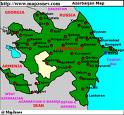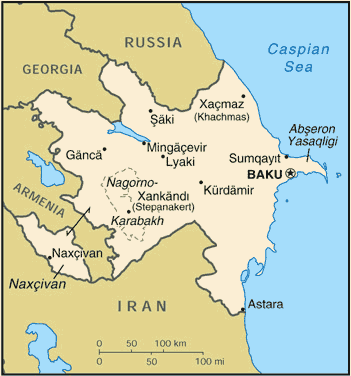The Iran War Theater’s “Northern Front”: Azerbaijan and the US Sponsored War on Iran

In a timely decision, Azerbaijan recently (mid-March) granted NATO the permission to use two of its military bases and an airport to “back up its peace-keeping operation in Afghanistan” including support for NATO’s “supply route to Afghanistan”. NATO’s special envoy Robert Simmons insists that the agreement has nothing to do with US plans to wage aerial bombardments on Iran.
Media sources in Baku have intimated that this timely agreement is directly related to ongoing US-Israeli-NATO war plans. Its timing coincides with US naval deployments and war games in the Persian Gulf.
The airport and two military bases are slated to be “modernized to meet NATO standards”. Washington has confirmed in this regard that it would “support the modernization of a military airport in the framework of the Individual Partnership Action Plan (IPAP) signed between Azerbaijan and NATO.

Meanwhile, the Defense Ministry of Azerbaijan released a statement to the effect that “Azerbaijan’s territory will not be at the disposal of any country for hostile acts against neighbours [Iran] ” (See Mardom Salari (Farsi), BBC translation, 5 April 2007).
This announcement by the Azeri Defense Ministry was in response to an off-the-cuff statement by US Undersecretary of State Matthew Bryza, at a press conference in Georgia (March 30) to the effect that “The United States hopes for permission to use airfields in Azerbaijan for military purposes.” (emphasis added)
“A lot of planes overfly Georgia and Azerbaijan on the way to Afghanistan. Should it prove necessary, we would like to be able to use an airfield in Azerbaijan,” the US diplomat said, answering a question concerning the modernization of a military airfield in Azerbaijan with the Americans’ help. (Nezavisimaya Gazeta, April 2, 2007)

Maj. Eric Lehman, GSSOP Task Force commander (Left), briefs Mr. Matthew Bryza, deputy
assistant secretary of state for Eurasian affairs(Center) and Ambassador Richard Miles (Right)
during convoy ambush training July 29th 2006 at Krtsanisi National Training Center about
25 kilometers south of Tbilisi, Georgia
According to Azerbaijani political scientist, Zardusht Alizade, the NATO/US military agreement with the Baku government pertains to several Azeri airfields, which could be used to receive and service US/NATO aircraft:
“Baku may also help the United States with data on ballistic missile defense’… Moreover, the words of the Azerbaijani authorities do not always match their deeds, and the statement of the Defense Ministry may be anything but the last word on the subject. “If the US Administration appeals to Aliyev and the latter summons the courage to turn the request down, all the better for him,” Alizade said. “I do not really think that he will want to peeve Washington.” According to the political scientist, the consequences of this step may be quite dire. Tehran has already proclaimed its readiness to strike at strategic objects nearby which are important for the United States. “Iranian capacities are not to be underestimated. A single division of its armed forces can occupy all of Azerbaijan without a second thought. I only hope that this is some sort of political game and that the United States does not really intend to strike at Iran,” Alizade said” (Nezavisimaya Gazeta, April 2, 2007) (emphasis added)
Strategic Caspian Sea Maritime Border with Iran
Azerbaijan is also strategic in view of its maritime border with Iran in the Caspian sea. In this regard, the U.S. Navy is involved in supporting the Azeri Navy, in the area of training. There is also an agreement to provide US support to refurbish Azeri warships in the Caspian sea.
The US sponsored Caspian Guard Initiative was launched in 2003 to “coordinate activities in Azerbaijan and Kazakhstan with those of U.S. Central Command and other U.S government agencies to enhance Caspian security.” The initiative was implemented under the cover of preventing narcotics trafficking and counter- terrorism, Its ultimate objective, however, is to provide USCENTCOM with a strategic naval corridor in the Caspian sea basin.
The US has also participated in joint Naval exercises with the Azeri Army’s 641st Special Warfare Naval Unit, headquartered at the Azeri Naval Station outside Baku.
More generally, both the US and NATO are in the process of deepening their military cooperation with Azerbaijan. In recent developments, military-political consultations between the US and Azerbaijan are scheduled to be held in Washington in the second half of April, according to a US Embassy source in Baku. (APA News, 4 April 2007)
“the consultations will cover issues on strategic cooperation, Azerbaijan-NATO relations, the mutual activity of both countries in Iraq and Afghanistan and some other issues.[Iran] (ibid)
The timing of these consultations is crucial. They coincide chronologically with a process of advanced military planning.
Azerbaijan could be the object of retaliatory strikes by Iran, if the country’s military bases are used by NATO-US forces as a launch pad for waging war on Iran.
Media sources in Baku have suggested that retaliatory bombings by Iran could include Azeri oil fields and oil and gas pipelines. The strategic Baku-Ceyhan pipeline, which links the Caspian Sea to the Eastern Mediterranean could also be a target. The Baku Ceyan pipeline is controlled by an Anglo-American consortium led by British Petroleum (BP).

In early April, Iran deployed troops and military hardware along the Iranian-Azerbaijani border. According to an April 4 report of the Azerbaijani news agency Turan:
“Military experts think that the deployment of troops and hardware pursue defence ends. This means that the troops are being pushed forward to repel attacks… The start of an information [propaganda] war is obvious. An intelligence expert has told Turan that recent publications in the media saying that Iran has drawn up a list of facilities in Azerbaijan that will be bombed in case of a US attack [on Iran] are a glaring example of this. Most likely, the reports were prepared and passed to the mass media by the Iranian secret services to exert psychological pressure on Baku. The goal is to deter Baku from supporting Washington in a military conflict with Tehran. (Turan, 4 April 2007) (emphasis added)
The Iran War Theater’s “Northern Front”
US and allied naval deployments are concentrated in the Persian Gulf and the Eastern Mediterranean. The March NATO/US agreement with Baku, while building upon previous military cooperation agreements, specifically reinforces what might be described as a “Northern Front” whereby Azeri military bases including airfields and naval facilities in the Caspian sea would be used by NATO and US forces in the case of US sponsored attacks on Iran.
If this were to occur, several Central Asian countries could be drawn into the conflict, leading to a process of military escalation. The latter could also extend into a ground war in which Iran would target US, British and NATO facilities in Iraq and Afghanistan.

